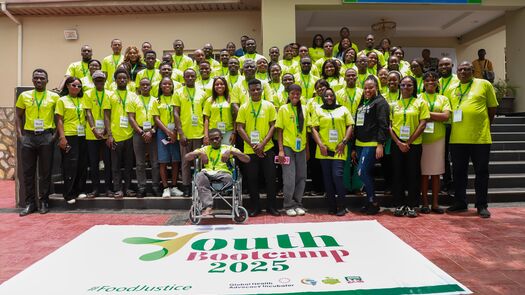November 25, 2025
The Global Health Advocacy Incubator’s (GHAI) Food Policy Program works with youth advocates working with the Jamaica Youth Advocacy Network (JYAN) and the Heart & Stroke Foundation of Barbados (HSFB) to engage and mobilize their peers in healthy food policy campaigns. JYAN educates youth advocates and helps them develop advocacy tools that promote healthy food policies while HSFB has slowly built a network of youth advocates over the years. GHAI provides JYAN with tools, resources and facilitation support.
This August 12th, in commemoration of International Youth Advocates Day, GHAI spoke with youth advocates from JYAN and HSFB to get their perspective on how youth advocates in their country work to promote healthy food policies in the Caribbean.

Why is this issue important for youth in Jamaica and Barbados?
Destini Cummins, HSFB: It is affecting us now and will continue to affect us in the future. If we don’t heed our actions, this problem can go on to shape our country’s budget, taking away resources, which may be critical to our development – not just on a national level, but a personal level, too.

Taahir Bulbulia, HSFB: We are faced with a significant health crisis in Barbados. A third of our children are overweight or obese, 80% of our deaths are associated with noncommunicable diseases (NCDs) annually and our government spends millions fighting this health crisis. Our youth are the future and with this alarming trend we need policies and programs to curb this crisis.
Kayla Wright, JYAN:There are several consequences that arise from lackluster and inadequate school nutrition policies, with issues ranging from the ability to function in schools to long-term health issues. The Global School-based Student Health Survey conducted in 2017 indicated that of Jamaican students aged 13-17 years, 23.3% were overweight, 9.2% were obese and 73.3% usually drank carbonated soft drinks one or more times per day. These statistics indicate troubling concern around Jamaican youth who are quickly experiencing the consequences of the lack of a balanced diet in their daily lives, which is not necessarily a fault of their own. Instead, Jamaican schools lack school nutrition policies which may circumvent the effects of unhealthy diets in our youth.
What advocacy tools do young people need to be able to advocate on this issue?
Taahir: Our youth need more programs catered to their holistic development which in turn will make them more capable of advocating on national issues and crises, as well as a platform where they can freely and openly advocate on the issues that affect them the most. We also need greater programs focused on grassroots advocacy to cater to the average person. When we create the consciousness needed from the general population, we can truly start making a greater impact.
Kayla: Youth advocates need specific tools like workshops, legal advocacy, online campaigns, and negotiation tactics to successfully advocate for healthy food policies in Jamaica. Building advocates’ capacity on negotiation tactics and legal and media advocacy through workshops to better equip them when working towards a school nutrition policy is key.
What are some of the challenges youth advocates in Jamaica and Barbados face in getting other young people to support this advocacy?
Destini: In Barbados, the youth still believe that NCDs like obesity and diabetes are an “old person’s disease,” despite their eating habits telling them otherwise. Because of this belief, most of them do not understand the seriousness of what we are advocating for, because they think it doesn’t affect them.
Kayla: There are a few challenges that may affect the support from Jamaican youth. Youth advocates lack access to healthy food and may not advocate for it because they are put off by its inaccessibility. There are also financial constraints from schools and advocates are sometimes discouraged when faced with the fact that the policies they are advocating for may not be sustainable in the long run.
What results are youth advocates working towards?
Taahir: For the government of Barbados to implement the National School Nutrition Policy, create greater consciousness and promote healthy and active lifestyles, and encourage more youth engagement and participation at the national level.

Ojea Sheckleford (JYAN): The Jamaica Youth Advocacy Network is working towards getting the School Nutrition Policy implemented. Currently there are a multitude of manufacturers and vendors that are advertising and offering unhealthy foods and beverages to students – at a time when the nutritional content in schools is being taken into consideration. Our efforts would allow Jamaican students to be healthier and reducing the NCD levels overall in our country.
What support do youth advocates need to succeed in building effective advocacy movements in Jamaica and Barbados?
Ojea: Funding and financial support, key technical partners, and societal support. Having financial resources is one of the most important parts of advocacy – money is needed to implement certain advocacy efforts like public demonstrations and advocacy campaigns. Technical partners are key within the world of advocacy because certain individuals and/or organizations have more influence in the court of public opinion. Working with these partners would allow youth advocates to have a greater advantage in our advocacy efforts. And finally, societal support is critical to youth advocacy. Most of the issues we address are those that affect the general public. If more individuals were made aware of these issues (and the solutions) there could be a greater effort from the public to address and tackle said issues.

What made you want to get involved in Food Policy advocacy?
Destini: During my last year in secondary school I learned about the ways NCDs were affecting the youth at my school. I interviewed Taahir Bulbulia and he opened my eyes to what was the result of the food consumption patterns in the country and that is what really drove it home for me.
Taahir: My love for people and solving real world problems – we have a crisis, and our people must be at the forefront. But my question is: how can I make a significant impact in the lives of people? If through my work people can change their lifestyle to become more conscious of their choices, then I know I’ll have made an impact?
Ojea: Healthy food policies offer solutions that could be used to offset a myriad of issues. We find that children are developing NCDs at a younger age, and that poses a major risk to the quality of their life. Students spend most of their day at school, and as such, most of their meals are also consumed there. Considering that most meals provided in schools are unhealthy, I see it as a cause for concern, because there isn’t enough being done to ensure that our students are eating healthy. I believe that food policy advocacy is important because it does not take away our option to eat whatever we desire, but instead allows us to have healthier options to choose from.

Learn more here about how our youth in the Caribbean advocated for healthy food policies and their best practices on how civil society organizations can engage youth in advocacy campaigns.



